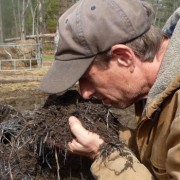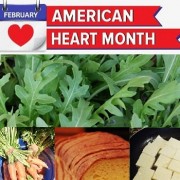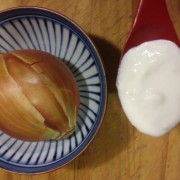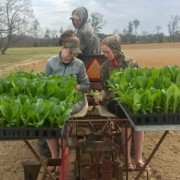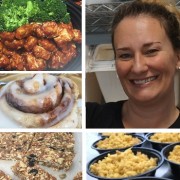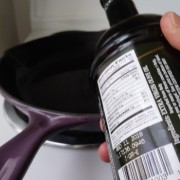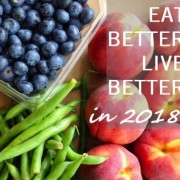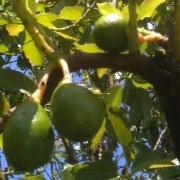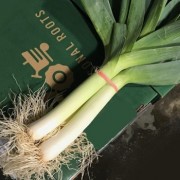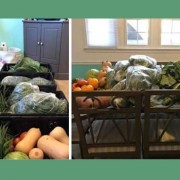4 reasons to support sustainable farming
And all 4 reasons make your life better!
– By the Veggie Fairy Team
That’s Farmer Charlie of Victory Farms in Henrico County, Va., in the photo. He clearly loves his compost, but why should you care about sustainable farming if you’re not a farmer? There are four good reasons why, and they all make our lives better. But first…
What is sustainable farming?
The USDA defines sustainable agriculture as “the production of plant or animal products using techniques that protect the environment and the welfare of humans and animals.”
Sustainable agriculture is focused on finding the right balance between our need to produce food and our need to preserve the environmental ecosystems that sustain our one-and-only planet.
One thing sustainable farming is NOT, is industrial. Industrial agriculture uses industrial techniques, including a heavy reliance on chemical fertilizers and pesticides. That’s how they churn out huge volumes of crops and livestock. Industrial farming operations often treat the plants, animals, and humans involved like inanimate parts on a factory assembly line instead of like living things.
And what are sustainable farming methods?
To grow our food, farmers need clean water and good soil, and they have to be able to keep certain pests from eating up their crops before we can even take a bite. Sustainable methods make all that happen with a minimum of toxic chemicals.
CROP ROTATION avoids the problems that build up when you plant the same crops in the same soil year after year. Many pests prefer specific crops and are happy to settle in, gorge on the steady food supply, and boost their numbers. Rotation breaks the pests’ reproduction cycle. Changing up the crops also changes what the plants take out of the soil and put back into it, reducing the need for chemical fertilizers. Farmers with pasture-raised cattle and chickens rotate them, too, fertilizing each field they pass through.
COVER CROPS are also used in the rotation process. In between the main crops, farmers plant cover crops like clover or oats. The cover crops prevent soil erosion, suppress weeds, and improve the soil quality without chemical fertilizers or herbicides.
SOIL ENRICHMENT produces good, healthy soil that’s full of life, which increases crop yield. In addition to cover crops, other sustainable methods of enrichment include leaving stalks and leaves to compost in the field after harvest, and using other composted plant material or animal manure. Some farmers rotate their cattle through harvested fields to graze on the leavings. They can be followed by chickens that eat the bugs in the cow manure, while adding their own rich manure to the mix — making them an all-natural source of fertilizer and pest management!
NATURAL PEST PREDATORS like pasture-raised chickens are an integral part of a farm that’s treated as an ecosystem instead of a factory. In addition to predator birds, there are predator insects like ladybugs and certain wasps that eat crop-eating insects. But when pesticides are used indiscriminately, the good insects get killed along with the pests. So integrated pest management relies on pest predators, crop rotation, and special techniques like introducing sterile male pests. Chemical solutions are only used as a last resort.
WATER & FUEL CONSERVATION includes drip irrigation instead of overhead spraying, so water isn’t wasted through evaporation. Many sustainable farmers also use solar or wind energy to power water pumps and electrical fencing.
And now… here are four reasons why all these methods make our lives better!
REASON #1: MORE NUTRITIOUS FOOD
Sustainable food is grown with fewer toxic chemicals in naturally enriched soil. Sustainably grown crops and animals absorb or eat those nutrients, producing food that’s more nutritious and less toxic.
REASON #2: SAFER ENVIRONMENT
Reducing pollution, chemical use, and soil erosion improves air and water quality for all of us. Fewer asthma triggers and carcinogens are good our health. And by working with nature instead of fighting it, sustainable farmers maintain bio-diversity and functioning eco-systems that the environment needs to stay healthy, too. Sustainable farmers continuously replenish the land so it will be there for future generations.
REASON #3: HAPPIER ANIMALS
Pasture-raised animals can engage in their natural behaviors and eat their natural diet. Not only are the animals happier and healthier, they produce food for us that’s richer in nutrients and healthy fats. And knowing that the animals are being treated humanely just feels good, too.
REASON #4: HEALTHIER COMMUNITIES
Sustainable farmers are exposed to fewer toxins, reduce their costs, and boost their crop yields. So they’re better able to make a living while simultaneously feeding the rest of us and reducing pollution. That contributes to a community with a stronger economy and a healthier environment, the kind of place we all want to live.
So how can you tell if your food was grown sustainably?
It can be hard for the average person to figure out whether each item they eat was produced using sustainable methods. There’s no “sustainable” label at the grocery store. The best solution is to go local and get to know all the farmers who grow your food. Yet that would be seriously time-consuming.
Fortunately, here at Seasonal Roots we check out the local farmers for you. So all you have to do is enjoy the food!
Read about the sustainable practices of these typical Seasonal Roots farmers:
Appalachian Harvest
Keenbell Farm
Saddle Ridge Farm
Victory Farms
For a deeper dive into the health benefits of eating sustainably, read the research collected by the GRACE Communications Foundation, a private foundation that advocates for sustainable alternatives.
ABOUT SEASONAL ROOTS
Since 2011, Seasonal Roots’ online farmers market has connected Virginia families with local family farmers who use sustainable, humane practices. Our veggie fairies – mostly moms who believe in living better through scrumptious, healthy eating, being kind to animals, protecting the environment, and spreading joy – home-deliver freshly harvested produce, eggs, grass-fed dairy and meat, plus artisan fare. We empower our members to eat better and live better with more nutritious, flavorful food that’s good for us and good for the planet. More info at seasonalroots.com.
